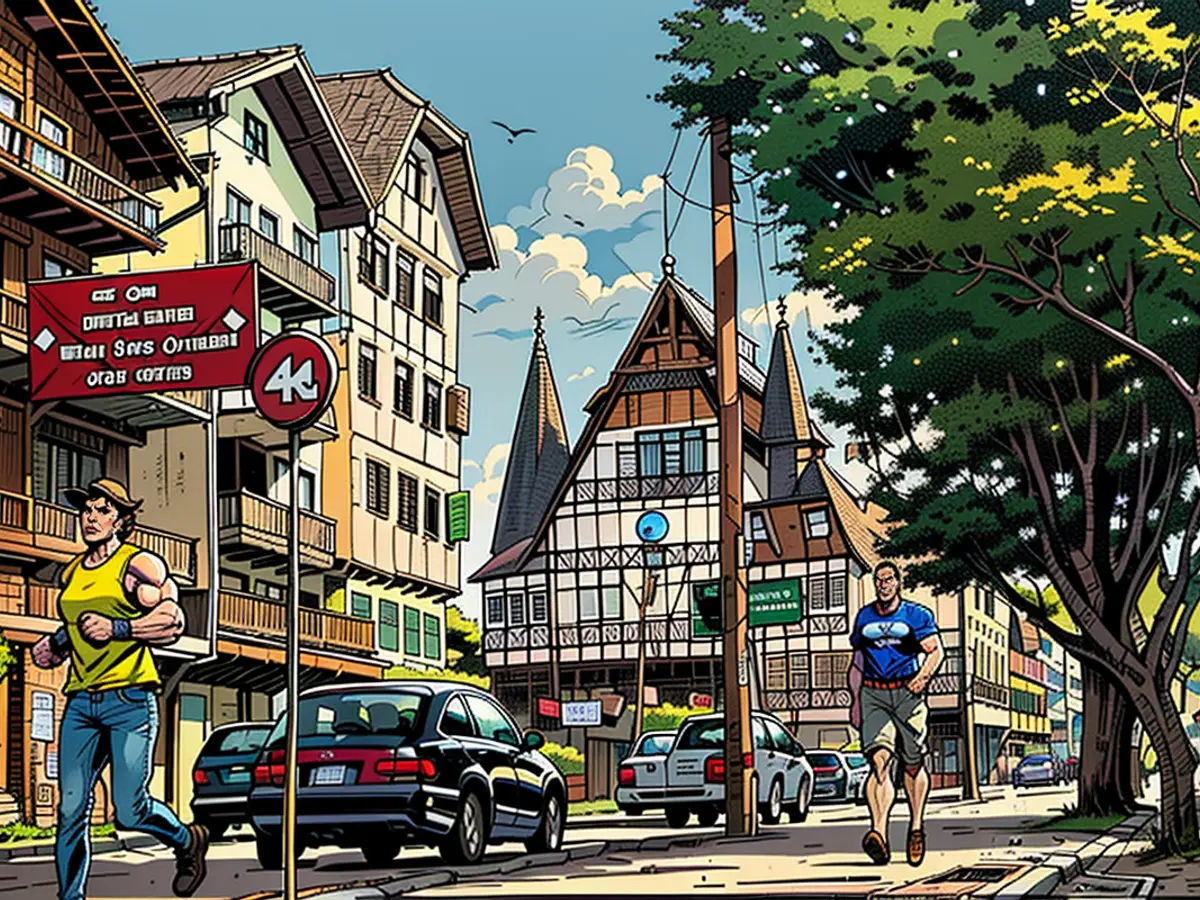German immigration has shaped Brazil until today
Two hundred years ago, the first German immigrants reached Brazil in search of a better life. Today, the largest German-speaking community outside of Europe resides in the country. They speak Hunsrückish or Westphalian, celebrate Oktoberfest, and have their unique characteristics.
Hand in hand they stand in a circle and hold various tools such as a screwdriver in the air. The human figures of this newly erected monument are intended to symbolize the immigrants who contributed to the building of the city of São Leopoldo in the south of Brazil. Among these were the Germans: The city is known as "the cradle of German immigration in Brazil" - the first of them arrived here exactly 200 years ago.
Approximately six million Brazilians are estimated to have German ancestors, as the Consul General in São Paulo, Martina Hackelberg, states. This represents nearly three percent of the population. It all started with 300,000 to 400,000 German-speaking immigrants who came in various waves to Brazil, as historian and emeritus university professor Martin Dreher relates. He himself has German roots. Being German-speaking refers to the fact that among them were not only people from the territory of the current Federal Republic but also Germans from Russia or from Austria-Hungary.
On the other side of the Atlantic, the newcomers preserved their traditions, founding, for example, singing, rifle, and gymnastics clubs. One of the most famous German traditions: the Oktoberfest in Blumenau. The city in the southern state of Santa Catarina displays numerous German traces through its many timber-framed houses.
This year, the second largest Oktoberfest in the world celebrates its 40th anniversary. People in costumes and Dirndls, specialties like Spätzle, Brezel, filled oven potatoes, Bratwurst, and of course Munich beer - it's almost like on the Theresienwiese, but in Portuguese. It's no wonder that almost all the first breweries in Brazil had German origins and were founded in the 19th century. The Instituto Martius-Staden promotes the cultural exchange between the two countries.
"In my community, where I come from, you can still meet many people who speak Hunsrückish," says Gerson Neumann, university professor at the Federal University of Rio Grande do Sul and also a descendant of German immigrants.
Brazil, according to the German embassy, is today the country with the most German-speakers outside of Europe. An estimated one to two million Brazilians speak High German and its dialects, according to the Martius-Staden Institute. "In my community, where I come from, you can still meet many people who speak Hunsrückish," explains Gerson Neumann, university professor at the Federal University of Rio Grande do Sul and also a descendant of German immigrants.
He comes from a small town in the interior, approximately 100 kilometers from Porto Alegre, the capital city of the Rio Grande do Sul state. In the immediate surroundings, many people still speak Westphalian. In cities like Pomerode in the state of Santa Catarina or in towns of the Espirito Santo state near Rio de Janeiro, Pommern is spoken.
Portuguese influences have shaped the German dialects and vice versa. An example: For dessert, one eats "Cuca," a new formation of the German word "Kuchen," and complements their bread with "Schmier," a Hunsruck expression for fruit confiture, Neumann explains. According to the Martius-Stadten-Institut, there are around 350 public and state schools and around 60 universities in Brazil that offer German lessons.
German influence on city names
Whether it's Novo Hamburgo, Nova Friburgo, São Leopoldo, or Pomerode: The Germans have left their mark on the city names as well. Pomerode was founded by Pommern settlers and refers to itself due to the predominantly German-descended population as "the most German city in Brazil." The Germans also founded numerous institutions such as schools, hospitals, charities, and chambers of commerce, which became a fixed part of Brazilian society.
Where they settled, there was almost no literacy left, explains Dreher. "The Germans were also the first to introduce kindergartens in Brazil," the historian continues. "And in Rio Grande do Sul, one cannot imagine the healthcare system without the hospitals that were founded by the Germans."
Brazil's most famous architect Oscar Niemeyer has a German name due to his German roots. Whether in Rio de Janeiro, New York, or Berlin - one encounters his buildings everywhere. His most famous project is Brazil's planned capital city Brasilia, which was built and declared a UNESCO World Heritage Site in less than four years.
Close economic relationships
Brazil is Germany's most important trading partner in South America and the only strategic partner of Germany in Latin America and the Caribbean. The cooperation is to be further expanded in bilateral and multilateral matters. Large German companies settled there in the 1950s and contributed to the building of the Brazilian industry.
According to the Industry and Trade Chamber, around 1,300 German companies have their headquarters in Brazil, primarily in the greater São Paulo region, as the largest German economic center outside Germany. In 2022, imports from Germany to Brazil were worth over 12.89 billion Euros. This mainly concerned machines, vehicles and car parts, as well as chemical and pharmaceutical products. Imports from Brazil to Germany were worth 9.17 billion Euros in the same year. This mainly concerned mineral and plant products, food, drinks, and tobacco.
The city of Pomerode, known as "the most German city in Brazil", proudly maintains its Pommern dialect, a remnant of the German settlers who founded it. Brazil, with its extensive German-speaking community, hosts the second largest Oktoberfest in the world, attracting thousands each year to celebrate in Portuguese.






